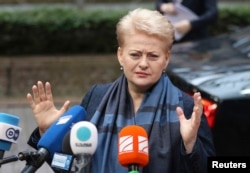The office of Russia’s Prosecutor General is reviewing the legality of independence granted to Lithuania, Latvia and Estonia in 1991 by the State Council of the former Soviet Union.
The move, announced by the office Tuesday, has alarmed the Baltic States and strained even further their increasingly tense ties with Moscow, since Russia annexed Crimea from Ukraine in March of 2014 and the pro-Russian insurgency in eastern Ukraine. All three countries have since increased their military spending.
Two lawmakers from the majority United Russia party, once headed by President Vladimir Putin, argued in their appeal to prosecutors that granting independence to Lithuania, Latvia and Estonia was illegal.
But Lithuanian President Dalia Grybauskaite said "Our independence was gained through the blood and sacrifice of the Lithuanian people. No one has the right to threaten it. Only we will decide our fate."
“Such ‘initiative’ by State Duma deputies are completely unacceptable and absurd,” Latvian news agency LETA quoted the Foreign Ministry’s press secretary as saying.
“The entire issue is legally absurd," Estonian Foreign Minister Keit Pentus-Rosimannus said to Reuters in response to an emailed question as reported by the news agency. "It serves as yet another example of the resurgent, imperialistic mood that unfortunately exists in Russia."
The Kremlin denied on Wednesday any knowledge about the review. Speaking to reporters in Vienna, Foreign Minister Sergei Lavrov said he knew nothing about the lawmakers’ initiative, adding that Russia has diplomatic relations and international treaties with the Baltics.
Latvia, Lithuania and Estonia have Russian-speaking minorities and were bewildered by a statement by President Putin last year in which he said that Moscow had the right to intervene militarily if necessary to protect Russian speakers abroad.






